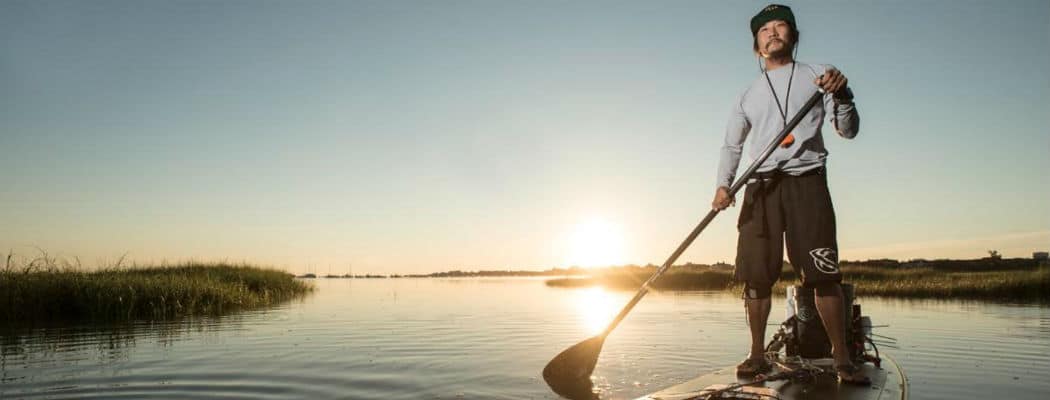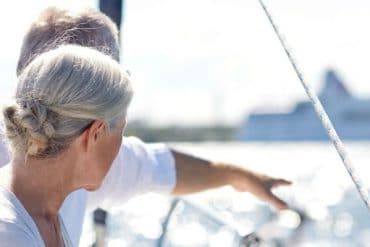Nantucket fisherman Justin Bell goes to extremes to land the ultimate catch.
There are more than a few good fishermen who call Nantucket home, but none are quite like Justin Bell. The forty-four-year-old island landscaper calls himself the “Mental Oriental” on Instagram, lives in a mid-island basement apartment, and doesn’t own a boat. You won’t see him showing off his catch to the tourists on Straight Wharf. In fact, you probably won’t see him fishing at all. But that’s just the way Bell likes it. He does his fishing by kayak and paddleboard, often in the darkness of late night or early morning, prowling the lesser-known spots around Nantucket’s ponds and harbors.
 It definitely is a way of life for me now,” Bell says. His Instagram feed is a window into that way of life, filled with photos of the forty-inch striped bass he regularly pulls from the ocean and of his other exploits from the beach. “Most of Nantucket’s great fishing spots are located where cars can’t go,” Bell said in a recent post. “This is my solution to the madness.”
It definitely is a way of life for me now,” Bell says. His Instagram feed is a window into that way of life, filled with photos of the forty-inch striped bass he regularly pulls from the ocean and of his other exploits from the beach. “Most of Nantucket’s great fishing spots are located where cars can’t go,” Bell said in a recent post. “This is my solution to the madness.”
While you might not recognize his name, if you’ve spent any time on Nantucket, you will probably recognize Bell’s face and his unique style. Maybe you’ve seen him cutting hedges in ’Sconset. Or perhaps he was riding his skateboard downtown. Or maybe it’s a fuzzy memory of the guy who used to dance to the DJ until the sun came up. He’s worn many hats over his years on the island and even earned the nickname “The Legend” from a group of local teenagers who were in awe of the fact that Bell does not appear to age like the rest of us (he could pass for a twenty-something). “You don’t choose your nicknames,” he says with a laugh.
A series of unlikely circumstances brought Bell to the island at a young age. He was born in 1973 a world away from Nantucket in Seoul, South Korea. Around his second birthday, Bell was placed in an orphanage and was soon adopted by a Catholic family from New York. Bell’s adopted father was an investment banker, his new mother a nurse, and the couple had been vacationing on Nantucket since the mid-1960s. They quickly introduced their new son to the island.
 Nantucket is where Bell “caught the bug” for fishing. Some of his earliest memories, he says, are of riding his bike down to Straight Wharf in the morning and fishing from the pier until he had to come home for dinner. Back in New York, Bell bounced around
to different
schools, both
public and private, including an all-boys school. He was an athlete in his high school days, playing football and lacrosse, and excelling in wrestling. But a freak injury to his face during a practice required reconstructive surgery and dashed any hopes he had of a wrestling scholarship.
Nantucket is where Bell “caught the bug” for fishing. Some of his earliest memories, he says, are of riding his bike down to Straight Wharf in the morning and fishing from the pier until he had to come home for dinner. Back in New York, Bell bounced around
to different
schools, both
public and private, including an all-boys school. He was an athlete in his high school days, playing football and lacrosse, and excelling in wrestling. But a freak injury to his face during a practice required reconstructive surgery and dashed any hopes he had of a wrestling scholarship.
After a year at Colby-Sawyer College in New Hampshire, Bell quickly realized it wasn’t for him. At nineteen, he returned to the place that felt like home: Nantucket. It was the mid-1990s, and Bell was finding his niche on the island. By day, he worked at places like The Juice Bar, the Indian Summer surf shop, and the White Dog Café. He even had a brief stint folding Nantucket Reds at Murray’s Toggery Shop. By night, he’d do his best to sneak into The Chicken Box or The Muse.
While the island was where he wanted to be, there was still a sense of isolation due to the lack of diversity on the island at that time, Bell says, something that has begun to change only recently. “In the seventies, eighties, and nineties, even until about four or five years ago, I was one of the only Asians out here for a while,” Bell says. “It was weird being one of only a handful of Asians on the island, or people that were different.”
 Meanwhile, though, he was still honing his craft on the water. While his father and grandfather taught him the basics, Bell is largely self-taught when it comes to fishing. “It was a lot of trial and error, and I’d watch a lot of redneck TV, all the old fishing guys,” Bell says. “And just doing mad-scientist type stuff. Like seeing if this works or that works.”
Meanwhile, though, he was still honing his craft on the water. While his father and grandfather taught him the basics, Bell is largely self-taught when it comes to fishing. “It was a lot of trial and error, and I’d watch a lot of redneck TV, all the old fishing guys,” Bell says. “And just doing mad-scientist type stuff. Like seeing if this works or that works.”
While many of his fishing expeditions are still solo, Bell’s fifteen-year-old son Francis now joins him occasionally, although he is currently living with his mother on Maui. And Bell’s skills have also earned him a few new disciples: two young men who sought Bell out to take them fishing. What generally was a solitary hobby for Bell has now become an opportunity to teach and share his knowledge.
But four years ago, his passion for fishing nearly got him killed. Today, he refers to the incident as his “swim.” It was late May of 2013, and Bell was fishing for stripers on a sandbar in Polpis Harbor, a spot where he’d cast a line hundreds of times before. Long after the sun had gone down, he decided to call it a day, but as he started walking back to the shore, Bell came across an unexpected drop-off in the sandbar. The tide was coming in, his backpack filled with water, and Bell suddenly found himself fighting against the current and the wind.
He ditched his fishing gear, cut loose his waders, and swam toward a small buoy he spotted above the surf. At this point it was pitch black, and Bell was freezing, tired, and disoriented. He swallowed his pride, pulled his cell phone out from a waterproof case, and called 911.
 The island’s public-safety agencies sprang into action, and after a harrowing search coordinated by police dispatchers, Bell was rescued about two hundred yards from shore after more than two hours in the water. His rescuer was a familiar face: firefighter John Allen, who reached Bell on a paddleboard. After an ambulance ride and a brief stay at Nantucket Cottage Hospital, Bell was back to work and fishing again within the week. It wasn’t clear to him at first, but in hindsight, he sees that the experience changed him. “I’m less of an introvert now and more of an extrovert,” Bell says. “People came up to me on the street after that. It’s hard to describe other than to say it’s good to be alive.”
The island’s public-safety agencies sprang into action, and after a harrowing search coordinated by police dispatchers, Bell was rescued about two hundred yards from shore after more than two hours in the water. His rescuer was a familiar face: firefighter John Allen, who reached Bell on a paddleboard. After an ambulance ride and a brief stay at Nantucket Cottage Hospital, Bell was back to work and fishing again within the week. It wasn’t clear to him at first, but in hindsight, he sees that the experience changed him. “I’m less of an introvert now and more of an extrovert,” Bell says. “People came up to me on the street after that. It’s hard to describe other than to say it’s good to be alive.”
Today, Bell is toying with the idea of parlaying his love for fishing into a venture that could make him a living, not just dinner. He has begun to explore what he calls foot-guiding: taking people out to his spots and putting them on fish, a sort of ecotourism that Bell believes there is a strong market for during the high season on Nantucket. Regardless of whether the idea pans out, he says, his over-all philosophy on fishing will remain: “First of all, go out and have fun. Go out and try. That’s how I catch fish. I’m going out to have fun first.”






